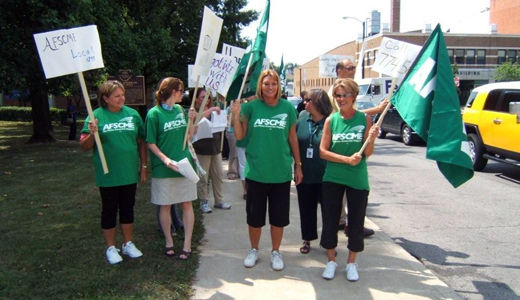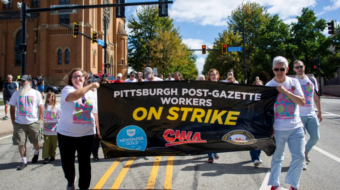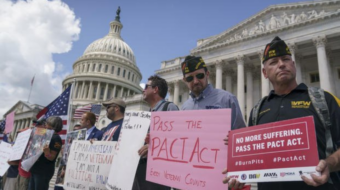
Just as they are doing in states all over the country, Republicans legislators and the Republican governor in Ohio are intensifying their campaign to turn public workers into scapegoats for the economic problems in their state.
While President Obama struggles to draft a national budget that would rescue state governments drowning in debt, the Ohio State Senate’s assistant majority leader, Shannon Jones, has introduced a bill that abolishes the right of public service workers to engage in collective bargaining. It’s a right public service workers in Ohio have had for almost three decades.
Ohio’s AFL-CIO President Tim Burga called the bill “Republican partisan politics” and said “they are trying to place the blame for the state’s economic difficulties onto the state’s public workers and onto the unions.”
The State Senate Insurance, Commerce and Labor Committee held hearings on the bill Feb. 10. Unions throughout Ohio sent representatives to the hearing, filling the Senate Finance room and an overflow room.
Sara Kaminski and Dave Witt, executive director and communications committee member, respectively, of the Ohio Conference of the American Association of University Professors sent letters to hundreds of their higher education colleagues about the issue.
The letter told the college teachers that the AAUP was “on top of this bill as soon as it was introduced and is currently working alongside other public employee unions to combat it.”
The AAUP, according to Kaminski, is providing its members with details of the legislation, talking points for communicating directly with state legislators in their own districts, sample letters to the editor and a variety of research materials.
Firefighters and nurses, meanwhile, have been writing letters to state legislators telling them about the work they do and the importance of that work to the communities they serve. The letter writing campaign has been coordinated by the Ohio AFL-CIO.
“Senator Jones, Governor Kasich and their political allies blame workers for problems they did not create,” said Burga. “Workers are not the reason tens of thousands of jobs have been outsourced from Ohio to China or Mexico. Workers did not create the economic recession that increased joblessness and pushed people out of their homes. Workers are not the cause of Ohio’s $8 billion projected budget deficit.”
The labor movement has been arguing that the budget crises in the states stem from the record unemployment rates. Their argument, simply, is that people without jobs cannot pay taxes.
The attempt to shift blame for the budget crises onto public workers and more specifically, the attempt to use the crisis to take away workers’ collective bargaining rights is not limited to Ohio. Similar moves, to one degree or the other, are underway in other states including Florida, Maine, Pennsylvania and Wisconsin.
Public service workers have economists on their side, many of whom back their contention that it is not the pay and benefits earned by public workers that has crashed the state budgets.
A study released Jan. 7 by the Economic Policy Institute, shows that public workers are paid less than private sector workers, even when factoring in employer-provided benefits.
The study, written by Rutgers University professor Jeffrey Keefe noted: “Private sector workers earned average wages of $55,132, $6,061 greater than the $49,072 earned by public sector workers. When looking at total compensation including employer-provided benefits, the gap narrowed but the private sector workers still earned $2001 more per year than the public sector workers ($71,109 in total compensation versus $69,108).”
The gap, according to the study, was far larger among more educated workers. College educated workers on average earned $22,966 less in total compensation.
Photo: Creative Commons 2.0 Public workers are under attack from the GOP.










